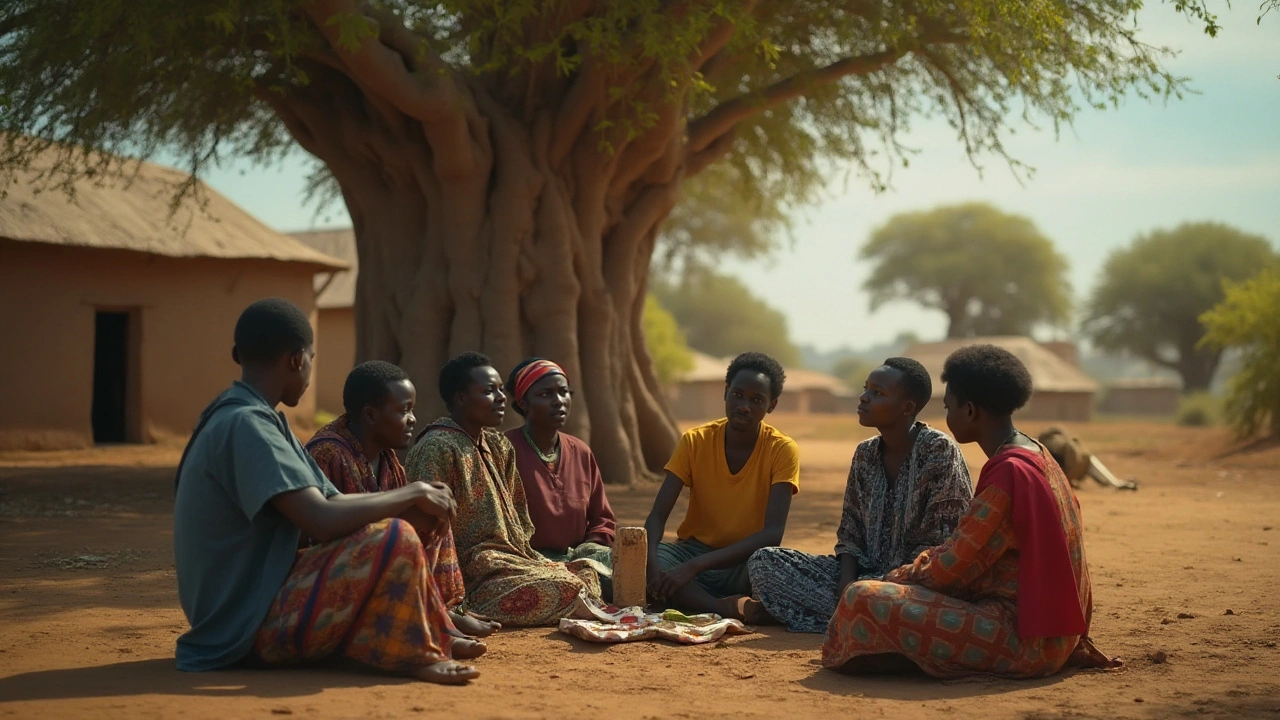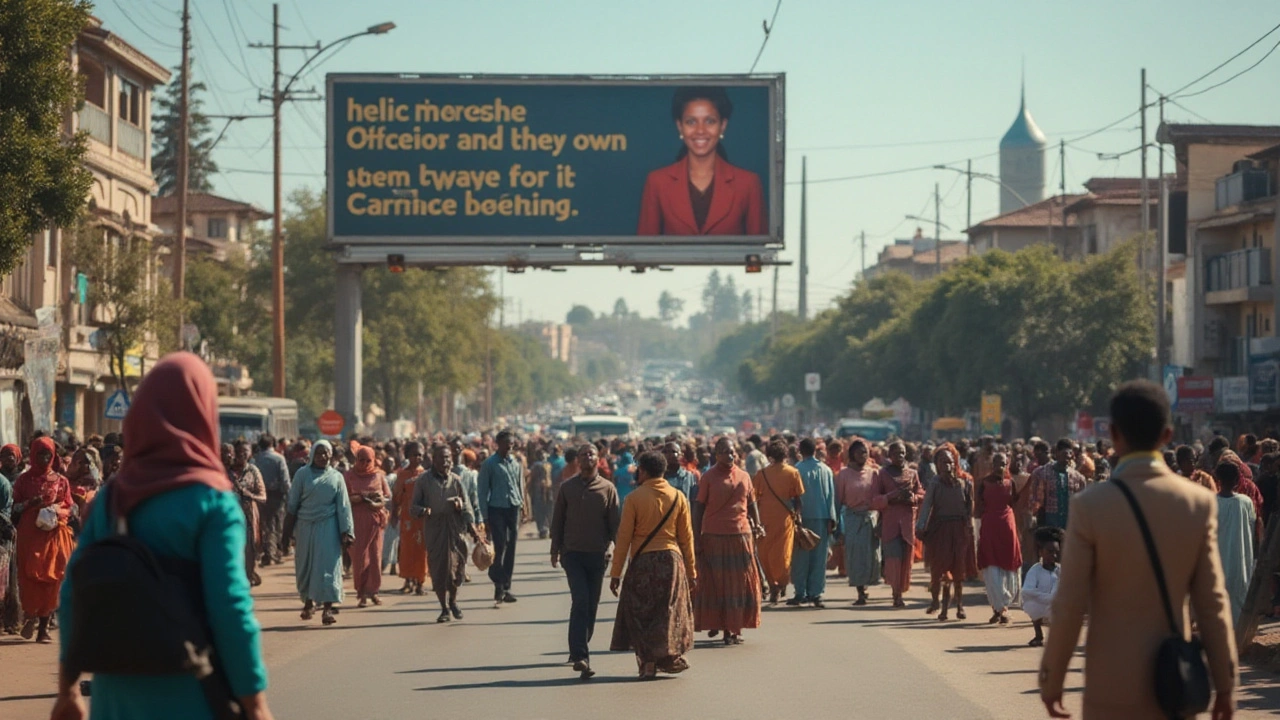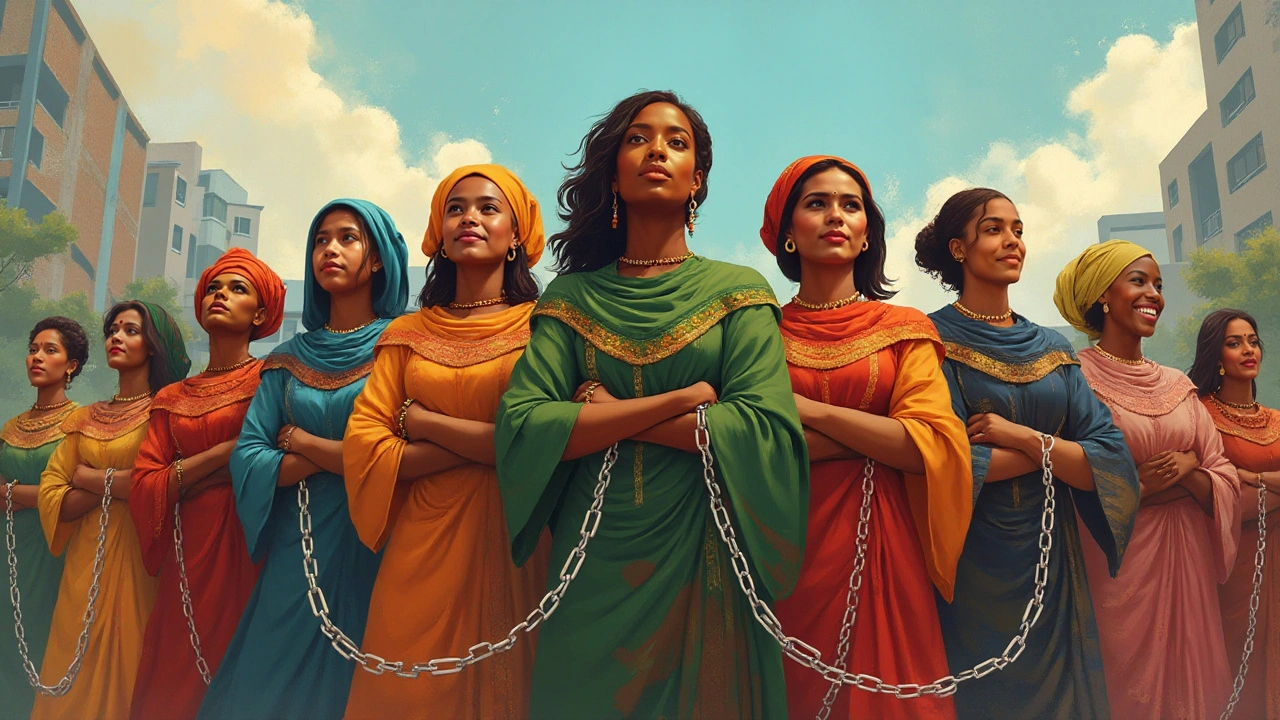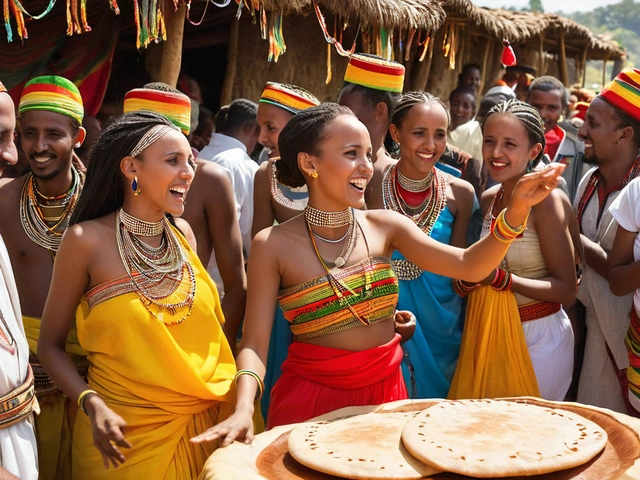Ethiopia is a country renowned for its vibrant culture and deep historical roots. Yet, like many places with a rich past, it grapples with inherited traditions that can be damaging, especially when viewed through the lens of modern ethics and human rights. These cultural artifacts, though sometimes cherished, often impact individuals in ways that ripple out to affect career opportunities and social structures.
In this space, we'll explore ten traditional practices considered harmful by many human rights organizations. From early marriage to stigmatizing customs, we'll discuss their origins, how they persist today, and the hurdles they create, particularly for women and young people striving for professional advancement. Understanding these practices is crucial for anyone looking to impact societal change and professional development in Ethiopia.
- Introduction to Harmful Practices
- Impact on Society
- Cultural Context and Challenges
- Steps Towards Change
Introduction to Harmful Practices
Delving into the heart of Ethiopia's cultural tapestry, one can find a wealth of customs passed down through generations, each carrying the legacy of the past. However, amidst the colorful traditions lies a darker reality — practices that, though rooted in age-old beliefs, have significant and often negative repercussions on health, education, and career progression. These harmful traditional practices are not just social relics; they are active elements shaping the lives and futures of many Ethiopians today.
One of the most pressing concerns is the practice of early marriage, which affects countless young girls across the nation. This tradition, deeply entrenched in certain communities, often curtails a young girl's education and prospects of a fulfilling career. According to UNICEF, Ethiopia has one of the highest rates of child marriage in the world. This practice forces many girls to forgo education, which is a pivotal gateway to economic independence and professional opportunities. As a result, early marriage perpetuates a cycle of poverty and limits the nation's economic potential by sidelining a significant portion of its workforce.
Narratives of female genital mutilation (FGM) are similarly alarming. Despite legal frameworks like the Revised Family Code and the 2005 Penal Code amendment aimed at eradicating FGM, the practice still persists in many areas. This practice not only poses severe health risks but also influences educational outcomes. Girls undergoing FGM are more likely to drop out of school due to health complications and social stigma, hindering their future career prospects. These practices underline the need for culturally sensitive education programs that promote human rights.
Furthermore, it is crucial to acknowledge the role of stigma and superstition in perpetuating certain harmful traditions. Practices like "evil eye" exorcisms and ostracization of individuals with albinism, though less economically impactful, contribute to a culture of fear and exclusion. Such customs affect the mental and social well-being of individuals, reducing their confidence and willingness to pursue educational and professional endeavors.
The task of addressing these harmful practices requires concerted efforts from all sectors of society. Education, legal reform, and grassroots advocacy are key components in the movement towards change. There is a growing recognition among Ethiopian and international communities of the need for sustainable solutions that respect cultural heritage while protecting individual rights. As Dr. Abiy Ahmed Ali, the Prime Minister of Ethiopia, noted, "Our culture is our strength, but we must discard what harms our people."

Impact on Society
When talking about Ethiopia and its harmonic blend of cultural diversity, it's impossible to ignore the shadow cast by certain traditional practices. These practices aren’t mere customs; they mold the very social fabric, sometimes restraining growth and casting long-lasting impacts on both individual and community life. Certain traditions, while rooted in history and valued for their preservation of culture, have trickled into society as detrimental paradigms. This often occurs at the crossroads between longstanding beliefs and the ever-evolving ethics of modern society.
The ripple effect of these practices on career opportunities is profound. Early marriage, for instance, often truncates educational paths, affecting not just academic growth but long-term career prospects. According to data from UNICEF, about 40% of Ethiopian girls are married before their 18th birthday. This choice, or lack of choice, drastically alters their life trajectory, often keeping them bound to domestic roles. The ripple extends to health and socio-economic status, effectively creating cycles of poverty and lower education.
Physical harm due to practices like female genital mutilation (FGM) contributes another layer of complexity. FGM is not just an infringement on rights but a practice leading to severe health consequences. The World Health Organization reports that 65% of Ethiopian girls undergo some form of FGM. The aftereffects steer into the workforce, manifesting as medical ailments that can limit productivity and pose attendance challenges. This doesn't just impact the individual but resonates through communities, burdening local healthcare systems and fostering gender disparity at workplaces. Such health issues perpetuate the stigma, creating a complex loop where women are often trapped in lower-income jobs.
"The commitment to end harmful practices is not merely an obligation but a pathway to a future where society thrives equally," noted Dr. Nuriya Roba, a prominent Ethiopian health advocate.
Social structures built on certain traditional practices often enforce rigid hierarchies, limiting innovation and the full participation of certain groups. The stigma tied to some customs can also result in exclusion, both socially and professionally, limiting teamwork and diverse perspectives in any working environment. Communities relying heavily on tradition may neglect powered-by-progress opportunities, thereby stalling growth comprehensively. Addressing these issues requires a blend of education, advocacy, and policy change.
Efforts to tackle the impacts of these practices have seen some light through initiatives by NGOs and the government. Programs focusing on education and women's empowerment act as cornerstones for change. Such initiatives have begun to shift perceptions, influencing younger generations to challenge dated norms and forge new paths. Policymakers continue to draft legislation aimed at protecting the rights and advancing the societal position of those traditionally marginalized. By highlighting these contrasts to tradition, evolution manifests within society, shaping a landscape where harmful practices diminish their grip.

Cultural Context and Challenges
Ethiopia's cultural landscape is as diverse as its geographical one, with over 80 distinct ethnic groups, each fostering unique traditions. These practices, while integral to cultural identity, can pose significant challenges when they conflict with contemporary values, especially regarding gender equality and personal freedom. The issue arises particularly when practices like early marriage and Female Genital Mutilation (FGM) are considered not just traditional but mandatory rites of passage. The tension between preserving cultural heritage and advancing human rights creates a complex dynamic in Ethiopian society.
In rural areas, tradition often weaves itself into daily life with more complexity than in urban centers. Here, longstanding customs dictate not just social ceremonies but also how communities interact with sectors like education and employment. For instance, early marriage, often seen as a protected tradition, severely hampers educational opportunities for young girls. Once married, many of these girls drop out of school, effectively ending any chance of professional growth. The challenge is finding a balance where cultural practices can be respected while not undermining the individual's growth and health.
Despite these challenges, there's a growing movement within Ethiopia, championed by local activists and NGOs, to rethink these traditions critically. Arguments for change often hinge on emphasizing the underlying values of these practices, such as community loyalty and respect, while discarding harmful aspects.
According to a local activist, "Tradition should not be an excuse for oppression. We must adapt our customs to uphold the dignity and freedom of every individual." This sentiment reflects a slow but hopeful shift towards reimagining traditions in a way that honors both past and future generations.
Government support is crucial in this transformative period. While policies have been implemented to outlaw some practices like FGM and child marriage, enforcement remains inconsistent. The gap between legislation and execution can be vast, mainly due to limited resources and deep-seated cultural resistance. To bridge this chasm requires concerted efforts from both policy-makers and the society at large, fostering awareness and understanding of the far-reaching effects of these traditions.
Adding complexity to cultural challenges is the role of education, which serves as both a tool for empowerment and a battlefield of ideas. Schools present alternative worldviews that sometimes clash with traditionalist perspectives at home. However, education is imperative for informing the younger generation about their rights and providing them opportunities for professional success. Strategic educational programs that incorporate respect for ethnic diversity while promoting human rights could significantly impact how harmful traditional practices are perceived.
What remains clear is that addressing harmful traditional practices in Ethiopia requires a nuanced approach. Change must come from within the communities, supported by legal frameworks and education, to ensure it is both meaningful and lasting. In an increasingly interconnected world, Ethiopian society stands at a crossroads where the path chosen will influence not just the preservation of culture, but the direction of development and the potential of its people.

Steps Towards Change
Change is often seen as a daunting task, especially when it deals with age-old traditions deeply rooted in society. However, addressing these harmful traditional practices in Ethiopia is a step-by-step journey that begins with awareness and education. One of the pivotal strategies involves implementing educational programs that raise awareness about the consequences of such customs. Schools, community centers, and religious institutions can become hubs for such informative sessions, targeting all groups, but especially focusing on educating the youth. By opening discussions on the adverse impacts, communities can begin to see these practices in a new light.
The role of the government in policy-making and enforcement cannot be overstated. Constructing a robust legal framework that not only bans these practices but also actively provides protection to vulnerable groups is essential. Laws must be enforced stringently with a supportive legal aid system that victims can easily access. Creating laws is one part of the solution, but their enforcement is where real change takes root.
Another critical component is community involvement and leadership. In Ethiopia, the cooperation of community leaders, elders, and influencers, who hold sway over local customs, is vital for sustainable change. Engaging these leaders in dialogue to challenge and reinterpret cultural norms can lead to a significant decrease in such practices. They can champion campaigns that advocate for the rights and well-being of individuals, working from within the system to transform it.
"Change will not come if we wait for some other person or some other time. We are the ones we've been waiting for. We are the change that we seek." - Barack Obama
Economically empowering individuals, particularly women, can reduce dependence on harmful customs. Programs that provide vocational training and entrepreneurship opportunities can equip people with skills that open doors to new career paths, diminishing the trapping need for traditional roles. Microfinance initiatives can also play a significant part, offering financial independence that liberates those bound by damaging traditions.
Finally, international collaboration and support can bolster these efforts significantly. With ethical tourism, NGOs and global partners can contribute resources, knowledge, and fresh perspectives to Ethiopia's ongoing efforts to challenge and eventually eradicate these harmful practices. The synergy between local action and international backing creates a fortified front against customs that have long overstayed their welcome in contemporary society.

 The 7 Essential Occupations: A Deep Dive into Career Choices
The 7 Essential Occupations: A Deep Dive into Career Choices
 5 Booming Careers You Should Consider for a Bright Future
5 Booming Careers You Should Consider for a Bright Future
 How to Launch a Successful Business in Ethiopia: Essential Steps and Tips
How to Launch a Successful Business in Ethiopia: Essential Steps and Tips
 Navigating Employment Opportunities for Foreigners in Ethiopia
Navigating Employment Opportunities for Foreigners in Ethiopia
 Discovering the Rich Heritage of Ethiopian People
Discovering the Rich Heritage of Ethiopian People
Jordan Fields
October 9, 2024 AT 17:39The article presents solid data on early marriage rates.
Josephine Gardiner
October 12, 2024 AT 01:12The discourse surrounding Ethiopia's entrenched customs is rendered with commendable scholarly rigor; the author delineates the historical lineage of each practice whilst maintaining an objective tone, thereby facilitating an informed understanding for readers intent on fostering societal progression.
Divyaa Patel
October 14, 2024 AT 08:46Ah, the tapestry of tradition-so vibrant yet so fraught with paradoxes that it beckons the soul to contemplate the abyss between reverence and oppression.
When a girl is plucked from the halls of learning to become a bride before she can even fathom adulthood, the very notion of empowerment is rendered null.
Consider the generational echo: a mother who once endured the silent torment of FGM, now perpetuating silence for her daughter, believing it safeguards cultural identity.
The irony lies in the fact that cultural continuity should celebrate life, not curtail it.
Every early marriage is a fracture in the edifice of a nation’s economic potential, a loss measured not merely in lost wages, but in stunted innovation.
Education, the lantern of progress, is snuffed out when tradition demands obedience over aspiration.
Yet, within those very villages, one can witness the subtle resilience of youth, eyes alight with the yearning for knowledge despite societal shackles.
Grassroots initiatives that intertwine respect for heritage with modern rights narratives can act as a bridge, not a battleground.
The legal frameworks, though commendable, falter without palpable enforcement, leaving a vacuum that tradition exploits.
It is a painful dance: the elder’s reverence for ancients collides with the adolescent’s thirst for autonomy.
When communities are invited to reinterpret rites-preserving symbolism while shedding the harmful-true transformation occurs.
Such reinterpretation demands the courage to confront the ghosts of the past and the humility to allow new rituals to emerge.
International allies, when they tread lightly and listen, amplify local voices rather than drown them with external dogma.
The journey towards emancipation is neither swift nor linear; it is a mosaic of incremental victories.
In the end, the triumph of a single educated woman reverberates through the fabric of her family, her village, and, ultimately, her nation.
Larry Keaton
October 16, 2024 AT 16:19Yo, gotta say this stuff is real pain. Folks keep sayin’ it’s tradition but what’s trad if it kills dreams? We need to call out the elders, but do it with love – not a smackdown. Let’s get schools and churches on board, make ‘em safe zones where kids can actually learn stuff, not just get married off. Misspelling optional, but the point’s clear: change now or stay stuck.
Liliana Carranza
October 18, 2024 AT 23:52Hey Larry, you hit the nail on the head! Let’s flip the script – celebrate the vibrant dances, the music, the stories, and ditch the practices that chain our sisters. When we empower a girl with education, she becomes a beacon for her whole clan. Together we can rewrite the narrative, one brave step at a time.
Jeff Byrd
October 21, 2024 AT 07:26Wow, because nothing says "progress" like a dry list of stats. Maybe next time sprinkle some memes?
Joel Watson
October 23, 2024 AT 14:59While sarcasm may entertain the casual reader, the gravity of the data presented warrants a measured, analytical approach; the prevalence of harmful customs necessitates an interdisciplinary response.
Chirag P
October 25, 2024 AT 22:32I respect the need for academic rigor, yet we must also ensure that the discourse remains accessible to those directly affected; community engagement is paramount.
RUBEN INGA NUÑEZ
October 28, 2024 AT 05:06Absolutely, Chirag. Clear language coupled with precise data can bridge the gap between policy makers and local leaders, fostering concrete action.
Michelle Warren
October 30, 2024 AT 12:39i cant even read this it's too long.
Christopher Boles
November 1, 2024 AT 20:12Every voice matters, even those that find the length daunting; perhaps a concise summary could help more people engage with the issue.
Crystal Novotny
November 4, 2024 AT 03:46Summaries often strip nuance; the danger lies in oversimplifying complex cultural dynamics.
Reagan Traphagen
November 6, 2024 AT 11:19Don't be fooled – this so‑called "progress" agenda is a front for foreign powers seeking to destabilize Ethiopia's cultural sovereignty.
mark sweeney
November 8, 2024 AT 18:52Surely the only thing more dangerous than tradition is the hidden agenda of those who claim to "help" while pulling the strings from behind the curtain.